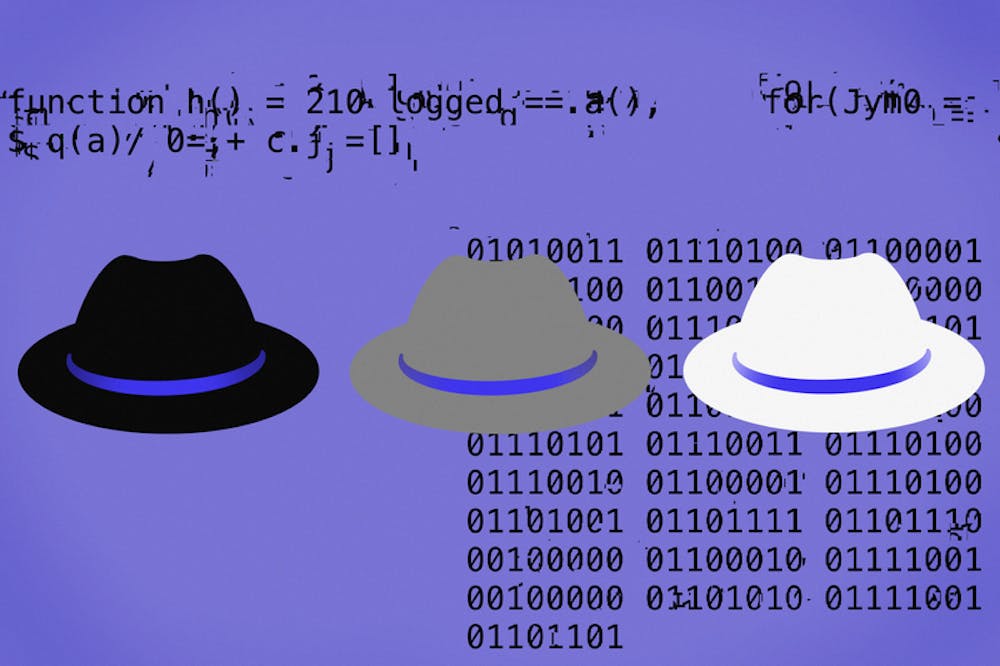With the rapid pace of technological innovation, there is a growing need for incoming professionals to not only master coding but also have a solid understanding of cybersecurity principles. The Hacking Club and Hacker Devils at ASU intend to meet that demand.
The Hacking Club at ASU is dedicated to cultivating the next generation of information security talent while equipping members to join its Shellphish team. The team competes in Capture the Flag (CTF), a type of individual or team-based cybersecurity competition.
Formerly known as pwndevils, the team quickly made its name in the CTF competition world and ranked 10th worldwide between 2015 and 2020. After merging with Shellphish, the oldest hacking team in the United States, the club continued competing on the international level and simultaneously worked to support beginners.
Jude O'Kain, a senior studying computer science and the president of the Hacking Club, shared the organization's focus on cybersecurity.
"We want to give them a space to basically learn more about exploitation or binary exploitation (finding vulnerabilities in a program), and the skills around that so that they can develop skills to find bugs in real-world software," O'Kain said.
Hacker Devils, another coding-focused student organization, fosters a strong coding community but with a different focus. While the Hacking Club emphasizes cybersecurity and CTF, Hacker Devils centers on enhancing programming skills and interview skills in job or internship applications.
Initially, Hacker Devils focused on going to hackathons, competitive events where people collaborate, create prototypes or products, or solve given problems in a short time. The club has recently shifted its mission to offer a more career-focused space for students to grow and succeed.
"Unfortunately, classes aren't the best resource to prepare for this," said Prathyush Vasa, a junior studying computer science and the president of Hacker Devils. "It's more of your outside personal work ... so we thought of a community of students that would come together, help each other solve these problems."
Hacker Devils has easy and medium sections, each offering relatively different degrees of difficulty in the problems they solve. The easy sections for problem-solving use an engagement-driven approach.
"We have our technical officers go around, pick problems every single week, give them to the students to try out and go around, discuss with them if there's any struggles or questions, and then go over the answers," Vasa said.
In the medium sections, the club provides instructions on various data structures with a higher level of programming.
Additionally, Hacker Devils is organizing several upcoming events to engage the coding community further. These events range from preparing for the annual Code Challenge and collaborating with The Software Developers Association in February to host mock interviews designed to prepare students for interviews for jobs or internships in the field.
Bethelehem Tejeji, a freshman studying computer science, felt satisfaction after overcoming coding challenges, a sentiment that has been shared by many students involved in these organizations.
"Coding is a really big and really frustrating puzzle, but I really like the reward I get at the end when I do eventually figure it out," Tejeji said.
In addition to their clubs' missions and initiatives, both O'Kain and Vasa offered advice for students interested in pursuing a career in coding and cybersecurity.
For computer science majors, O'Kain emphasized the importance of taking specialized courses such as CSE 365, information assurance, to deepen their understandings of computer security concepts and suggested CSE 466, computer systems security, for students interested in binary exploitation and finding bugs.
O'Kain suggests students start learning on their own using pwn.college. "It's like a whole curriculum that the cybersecurity professor made, and they made the platform open to anyone, so that the education itself is open."
For Vasa, practicing regularly, starting early and being patient are the keys. With the guidance from these student leaders and the unique opportunities these organizations offer, students are more prepared to step into the rapidly evolving world of technology.
"You also can't expect progress so quickly," Vasa said. "You've got to work hard. It's something you have to spend a few months, maybe a year, to even get some progress in. For anyone new to Hacker Devils or new to coding, practice, practice, practice."
Edited by Sophia Ramirez, Sophia Braccio and Katrina Michalak.
Reach the reporter at hhuynh18@asu.edu.
Like The State Press on Facebook and follow @statepress on X.
Nhi HuynhSciTech Reporter
Nhi is a freshman studying health care coordination. This is her second semester with The State Press. She has also worked as a content creator.
Continue supporting student journalism and
donate to The State Press today.




